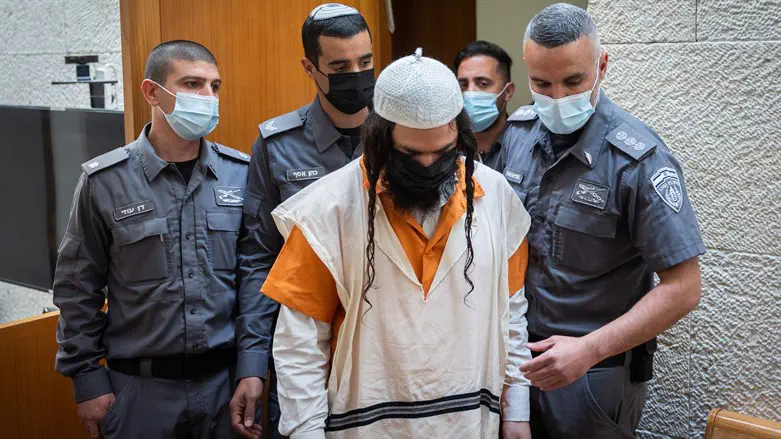
Attorney Avigdor Feldman, who represented Amiram Ben Uliel before the Supreme Court, claims that Ben Uliel’s confession was obtained under torture and should be treated as such. Feldman was hosted on Arutz 7 Hebrew site against a backdrop of calls to allow Amiram to celebrate Shavuot outside his solitary confinement. Although this was agreed to, it did not happen.
"In my opinion, Ben Uliel's verdict is an ugly scar on our legal system," says Feldman. "The General Security Service admitted in this case, which it does not do in other cases, that they inflicted incessant physical torture on Amiram for two nights. I am forbidden to provide details of the torture, but it is the type that causes continuous physical pain. The court rejected the confessions made immediately after the torture, but accepted his confessions given 36 hours later.
"The court ignored the fact that Ben Uliel was prevented from meeting with a lawyer during those 36 hours and that he was completely under the authority of the Shin Bet, making the threat of continued torture a constant possibility. In my understanding, the court should have rejected ALL confessions made by Ben Uliel."
Feldman emphasizes that aside from these confessions, there is no evidence linking Ben Uliel to the crime he is accused of (arson in the Arab village of Duma). As for the claim that there is sufficient evidence of his guilt due to the details that Ben-Uliel gave to his investigators, attorney Feldman states, "Absolutely not. The details in his confessions were public knowledge. There are no unique details in them that could have been known only to the person who committed the crime.
"There is absolutely no forensic or biological evidence that ties him to the crime.”
In Feldman's eyes, Ben Uliel should be released immediately. "They had no evidence against him until they started torturing him. There is no evidence from the field that could support his confession made to the Shin Bet operative who was responsible for the torture.”
Ben Uliel was returned to the site of the crime for a re-enactment of the crime with a policeman and a Shin Bet agent who threatened that if he did not confess, they had other means of making him talk, implying that the torture would resume.
Feldman also pointed out that the defense argued that the confession might have been admissible if Ben Uliel had been allowed to consult with a lawyer between the confessions, and if the interrogation would have been conducted by the Israel Police and not by the Shin Bet. “But none of this happened. On the contrary. The Shin Bet was present in a threatening manner during the confessions. When Ben Uliel finally met with his lawyer, Itamar Ben Gvir (now a gov't minister), he retracted the confession. Therefore, his confession is a confession that was extracted under torture and our experience shows that confessions obtained through torture are usually false. They are coerced confessions to satisfy what the torturer and provide him with what he wants to hear. "
Attorney Feldman pointed out that it was clear to the investigators that there was more than one person at the scene of the incident, and for that reason, they interrogated a Jewish minor, trying to implicate him, but he did not confess. "The Shin Bet admits that the torture produced a confession that does not match the facts on the ground. “
"Everyone agrees that torture may be acceptable in the case of a ‘ticking bomb,’ where the suspect is aware of a person who is planning to commit an imminent terrorist act threatening human life. Even the Supreme Court, which ruled out torture as a means of obtaining confessions, ruled that any means can be used to extract information to prevent a terror attack.
“However, no one ever claimed that Ben Uliel knew about anyone intending to carry out a terrorist act against Palestinians or others," says Feldman. ”Therefore, he was tortured without fitting the profile of a ticking bomb.”
As for Ben Uliel's chances of getting acquitted, Feldman says he doesn't know.
"He was denied another hearing, which in my opinion, is very problematic and controversial. Regarding a retrial, this depends on whether additional evidence is found that will disprove his involvement in the matter."
A version of this article by Yoni Kempinski appeared on Arutz Sheva's Hebrew site and was translated and edited by Ms. Shulman.